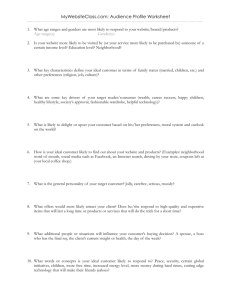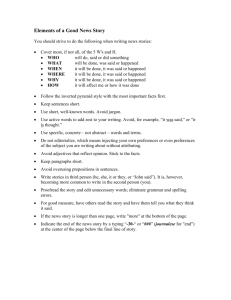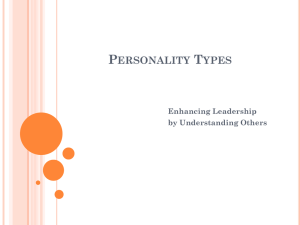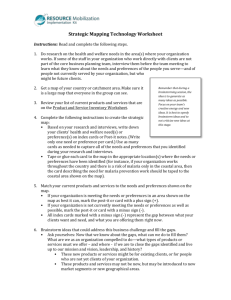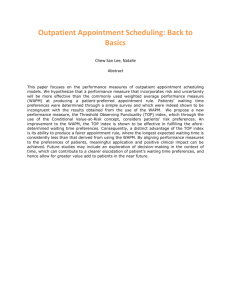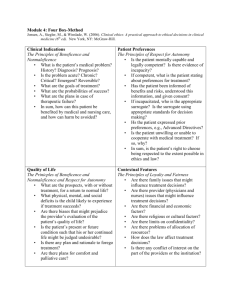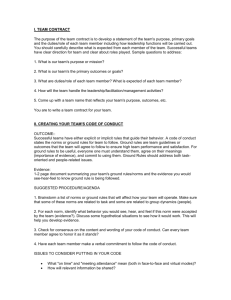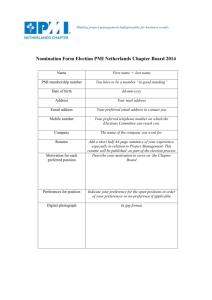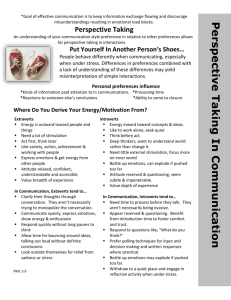The whole type, and how it relates to job
advertisement
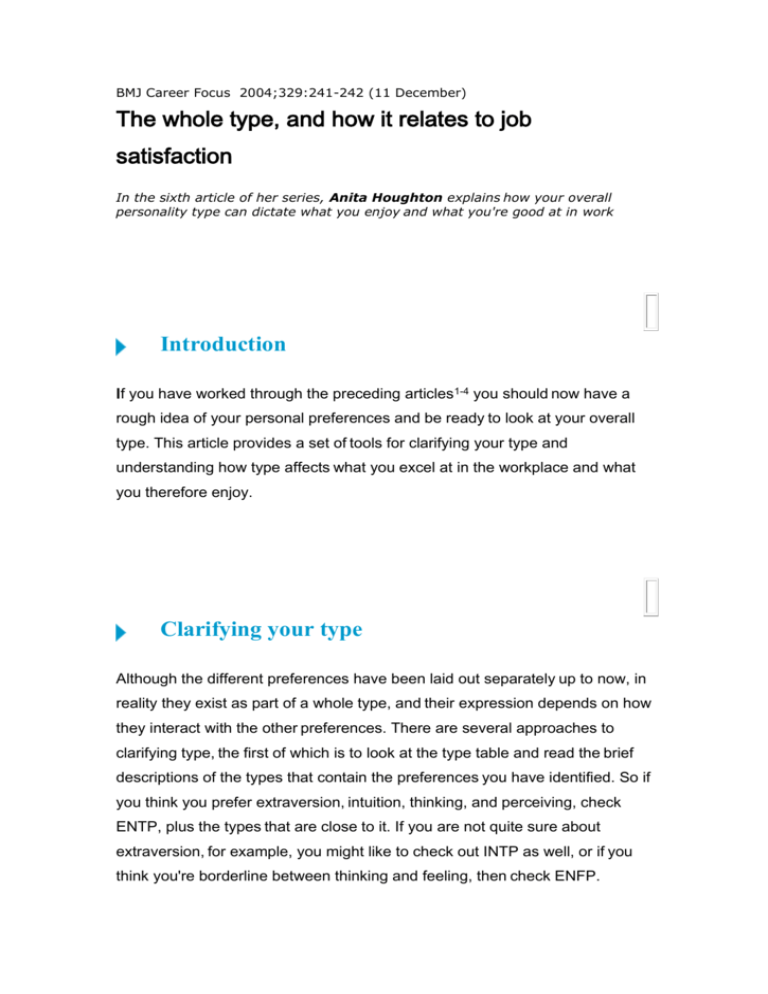
BMJ Career Focus 2004;329:241-242 (11 December) The whole type, and how it relates to job satisfaction In the sixth article of her series, Anita Houghton explains how your overall personality type can dictate what you enjoy and what you're good at in work Introduction If you have worked through the preceding articles1-4 you should now have a rough idea of your personal preferences and be ready to look at your overall type. This article provides a set of tools for clarifying your type and understanding how type affects what you excel at in the workplace and what you therefore enjoy. Clarifying your type Although the different preferences have been laid out separately up to now, in reality they exist as part of a whole type, and their expression depends on how they interact with the other preferences. There are several approaches to clarifying type, the first of which is to look at the type table and read the brief descriptions of the types that contain the preferences you have identified. So if you think you prefer extraversion, intuition, thinking, and perceiving, check ENTP, plus the types that are close to it. If you are not quite sure about extraversion, for example, you might like to check out INTP as well, or if you think you're borderline between thinking and feeling, then check ENFP. A second method of clarifying type is to look at the dominant functions for the types you relate to. In each type described in the type table, one of the two central preferences (N/S and T/F) is dominant, and is written in bold. This represents what that type does best, and is always expressed in the extravert or introvert mode, depending on which of these is preferred. For example, the dominant function of an ISTJ is introverted sensing, and the dominant function of an ENFJ is extraverted feeling. Preferences express themselves very differently depending on whether the preference is extraverted or introverted. To take the example of a medical department, Extraverted iNtuition (ENFP and ENTP) will tend to express itself in the generation of ideas for new services or projects, whereas Introverted iNtuition (INFJ and INTJ) will tend to express itself as generating new ways for understanding situations and solving problems. If you are unclear about your full type, try looking at the expression of different dominant functions below and ask yourself, which one describes what I do best in life? Expression of dominant functions: Extraverted Sensing Experiencing life to the full (ESTP, ESFP) Intuition Generating ideas for new projects (ENTP, ENFP) Thinking Creating logical order in your environment (ESTJ, ENTJ) Feeling Creating harmony in the outside world (ESFJ, ENJF) Introverted Sensing Storing and using details (ISTJ, ISFJ) Intuition Finding new ways of understanding (INTJ, INFJ) Thinking Using logic to solve problems internally (ISTP, INTP) Feeling Living according to internal values (ISFP, INFP) So what does all this mean for your work? A popular way of understanding type at work is to take the two middle letters, known as the functional pairs, as these have a huge impact on a person's strengths in the workplace, and what they enjoy. Each of the functional pairs has certain strengths and preferences in the workplace: ST: Like facts, are practical and analytical, and like using technical and administrative skills for finding tangible solutions to immediate problems. SF: Like using facts to provide the right practical and immediate help for people, and to create happy and harmonious environments. NF: Interested in ideas, possibilities and theories. Like using their insight to understand and develop people, both individuals and more widely. NT: Interested in possibilities and ideas, like using their analytical skills to solve complex problems and develop theoretical frameworks. http://careerfocus.bmjjournals.com/cgi/reprint/329/7479/241 In medicine, one of the important differences between specialties is The type table (UK prevalence in %5) in time scales and tangibility of results. In both surgery and emergency medicine, for example, results tend to be immediate and tangible (favouring Sensing), whereas in psychiatry and public health, results tend to be longer term and less tangible (favouring iNtuition). In general practice, an SF or ST may find great satisfaction in finding practical solutions for urgent problems, whereas an NF or NT may be more interested in psychosocial problems and complex conditions. Most medical jobs entail attention to both logical decision making (T) and people (F), but the balance between these may vary enough to make a job either enjoyable or dissatisfying. Laboratory work, for example, may provide too little contact with people for someone with a feeling preference, whereas thinking types may be challenged by the regular need to understand people's subjective experience in, say, palliative medicine. The clues to type at work Have a think about how your preferences affect your working life by pondering the answers to the following questions: What are your strengths at work, and how might they relate to your preferences? Think of someone whose help you often seek. How might their preferences (and how they reflect or differ from your own) explain what you value them for? Think of an aspect of work you find difficult or disagreeable. How might your preferences help explain why that is? Think of a colleague you find difficult or disagreeable. Again, see if your preferences and theirs can explain the problems you have relating to them What kinds of attributes do you most admire in others? Are any of these related to preferences? What to do if you are in the "wrong" job Symptoms of poor fit between type and job If you are in a job that is unsuited to your type the chances are that you will be feeling one or more of these: Tired, stressed or depressed Incompetent Unvalued Misunderstood, or Unable to use your strengths. Unchecked, all this may eventually lead to performance problems or ill health, or both. Investigation and diagnosis Using the questions above, examine all the different tasks in your job, and the people in it, and work out which parts you enjoy, and which you find difficult Estimate what proportion of your time you spend in each kind of activity Look around at your work environment, and the people in it. Which of the preferences dominate, and how do they match with yours? Treatment Do more of the things you like... Spot the tasks you're good at, and offer to do them Find a special niche for yourself that allows you to use your strengths Help people to understand what you're best at Find jobs that favour your preferences Find leisure activities that play to your preferences. ... and cope better with the things you don't like If your job is full of tasks you find difficult try the tips for coping with the bits you find difficult.1-4 In brief, these include: Getting help from people who find these tasks easy Doing your toughest tasks little and often, at the times of the day you feel strongest Thinking carefully about applying for jobs ill-suited to your preference Having a look at different departments to see if a new environment is all that is needed. If you are fundamentally unsuited to the work, or the specialty seems consistently to favour a different type, then simply understanding the problem, and how you can make a rare contribution as a result of your scarcity value, can be enough to help you survive or even thrive. Just occasionally, however, type can provide the evidence a person needs to know that a job is just not right for them. In that case, a change in career direction may be the best solution.6-8 When looking at type, always remember: We can all do everything—type tells us about our preferences, not our abilities None of the preferences exists in isolation People often say they behave differently in different situations. The best guide to your preferences is how you behave in the situations where you feel most at ease Type is useful for understanding and developing, it should not be used as an excuse for doing or not doing anything, or for criticising or typecasting others Type is probably inborn, but its expression is affected by personal circumstances, life stage, culture, upbringing, and so on. Anita Houghton, careers counsellor and coach London anita.houghton@btinternet.com
